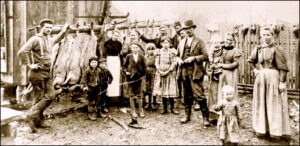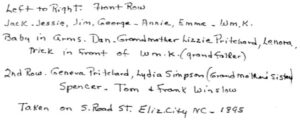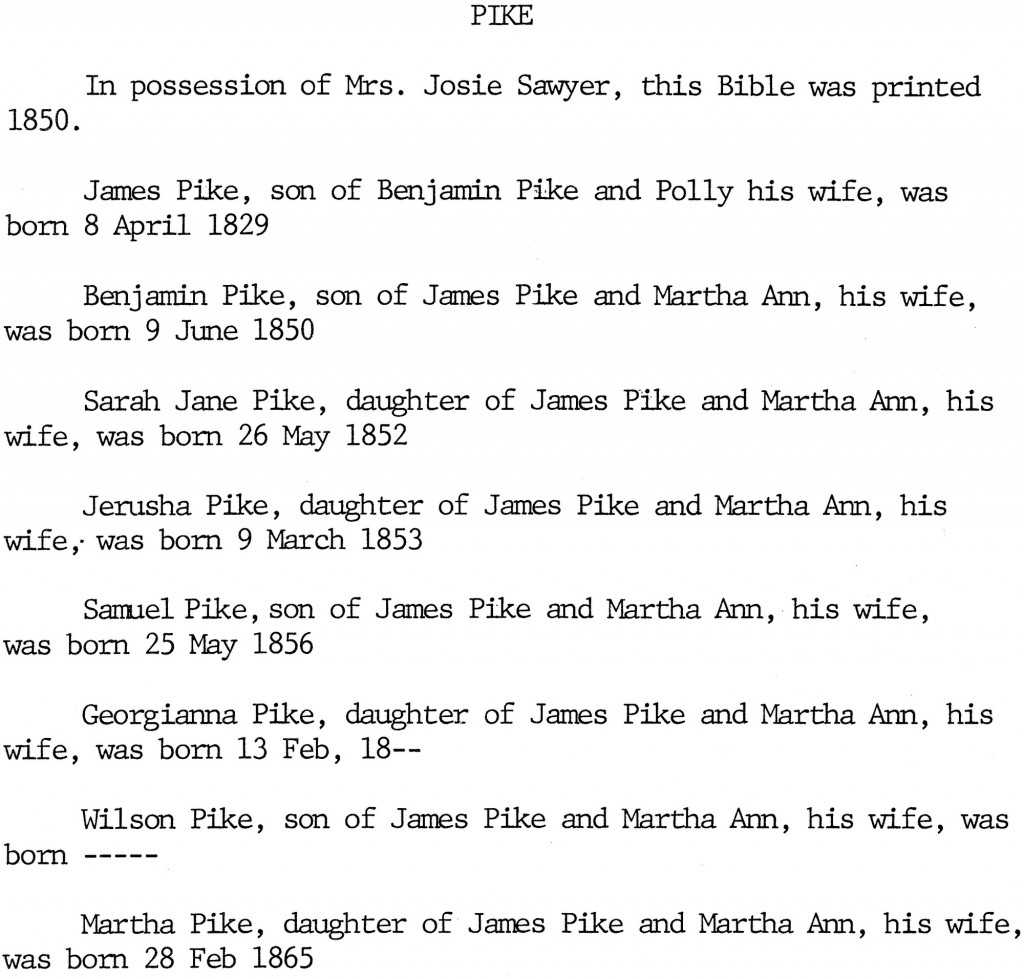SOME MEMORIES OF THE CARTER FAMILY
(By Sarah Frances Carter, daughter of W.K.’s 4th wife)
My father, William Kennedy Carter, was born in 1850 (I don’t have the date).
He was married four times.
His first wife, Victoria, presented him with four children: Spencer, Jack, Thomas, and Lenora.
His second wife*, whose name I have forgotten, died during childbirth, only two years or less after her marriage. The child died also.
The third wife, Eliza, bore seven children: Annie, Emma, Jess, George, James, Nixon, and Daniel.
His forth wife, Mary Elizabeth, also bore seven: Sarah, Claud, Katie, Leslie, Melvin, Mattie, and Calvin.
Papa was an undertaker, and his funeral home was on the same property as our house. He had three hearses: a large, black, very ornate one for adults (which was pulled by two magnificent coal black horses); a gray one for young people (pulled by a beautiful gray horse); and a pretty white hearse for children (pulled by a white horse). To me, they made an awesome sight, as the horses stepped majestically away, bearing the bodies of the departed ones to church or home for the funeral. In about an hour, they would pass our home, followed by a long procession of mourners, on the way to the cemetery. It was a very sad business, and I do not wonder that our father, W.K.C., needed to keep close to the Lord for strength and help.
In later years, he bought an “automobile hearse” after he had tried driving in our first car.
When I was about five years old (1910), Papa bought his first car. Until that exciting event happened, the family traveled by buggy or “surrey”. This was a two seated vehicle with no canopy nor protection of any kind from bad weather. We rode with “lap-robes” over our knees because of the dust kicked up by the horses on the dirt roads. This was fine in good weather, but if a sudden rain storm came up, we had to seek shelter anywhere we could find it.
But after Papa bought the car, things changed. Now, when we went several miles to rural churches, or to visit relatives, Papa drove the car. It was a one cylinder car, and had to be cranked to make it start (which was a long process). I recall once when Papa took me with him to a rural church, almost the whole congregation came out to see him crank the car. Very few people owned cars at that time, so they were quite a novelty.
This car was rather odd. It had an enclosed seat and a platform on the back which was useful for hauling things. Resourceful Papa built a removable wooden seat for the platform, which accommodated three kids. We enjoyed this, riding in the wind and seeing the sights without being checked on by our parents.
One Sunday, we took off for a trip of about 20 miles, so Mama packed a little basket of snacks for us in case we kids became hungry. I held the basket, and as we began to get hungry, I opened it just as the car hit a terrible bump in the road, scattering some of the precious snacks. I had to cover the basket quickly, lest it should happen again.
Sometimes the car got stuck on muddy roads, and Papa would have to trudge to a nearby farm to find a farmer who would bring his horses and pull us out.
In the city, we lived only a few blocks from our church, so we walked. I remember one Sunday a rainstorm came up while we were at church. Papa had brought an umbrella, which he held over Mama and the baby in her arms. Katie and I walked just behind them (supposedly under the protection of the umbrella). But we were just under the edge, and the rain poured off on our heads when it came over the edge.
Eventually, Papa bought a large car, a “seven passenger” which seated the whole family comfortably, and the old car was retired. Now when a heavy rain occurred on our trips, we just fastened on the curtains all around the car, and we were quite cozy.
One Sunday, an older brother and his family dined with us, and after dinner, we all piled in the big car for a drive. After we were all wedged in, and on our way, my youngest brother (about a year old) could not be found! We finally located him between Mama and the daughter-in-law, completely covered by their long, full skirts! Understandably, the car suffered some broken springs that day.
We children walked the eight blocks to school, but when rain came up during the day, Papa sent one of his employees to pick us up, while the other students watched enviously.
As the years went by, the stress and strain of the funeral home began to tell on Papa, and he was apparently headed for a breakdown. The doctor advised him to move to the country and spend as much time out of doors as he could. He bought a 92 acre farm, and tilled the ground, with the help of his children, who were growing up. Several horses were needed here, for plowing and harrowing. My sister Katie loved them and enjoyed riding them bareback. But I was afraid of them, and it was only when they were hitched to a plow or harrow that I dared approach them and drive them, with fear and trembling, up and down the field.
John, a frisky young bay, enjoyed teasing me at times. One day, he stopped in the middle of a row and refused to go on. I slapped him with the reins, and yelled at him, but he continued to stand stock still and refused to go on. He looked back at me, seemingly amused, and his expression said, “Make me.” Finally, I called Papa from another part of the field. He came, and just looked John in the eye and said quietly, “Go on John.” Respectfully, John went. Papa had a wonderful way with horses. I felt that he not only understood them, but they understood him. They respected him and obeyed him. All except Dynamite
We never understood why he kept this mean, uncooperative horse, unless it was to break his obstinate, evil spirit, and teach him to be cooperative. We kids were afraid of Dynamite. He loved to run down anyone he saw, so we tried to keep out of his way. He ran down Mattie one day, and it was only by God’s mercy that she was not hurt. Papa gave him a terrible beating for that. One day, I was trying to harrow a piece of land with him, and he was so ornery and rebellious that I had to call Papa, who tied him under a tree for the day. He had to watch the other horses go to their meal, while he had none.
A nearby neighbor who had treated Papa very badly, asked him one day for a loan of a horse for a few hours. To my delight, he loaned him Dynamite, who was probably the only horse that could be spared. We kids went to an upstairs window to watch the fun, as he hitched Dynamite to a plow. Of course the stubborn horse would not go one step, in spite of the lashing and yelling that our profane neighbor dished out to him. So Dynamite was brought back, and we kids celebrated the event by laughing and dancing around because our ornery neighbor “got his”.
Papa depended on Maude, the oldest of the horses for his heaviest work. There seemed to be a special bond between them. She always seemed to be so understanding and helpful that I never minded working with her. When Papa died, a very strange thing happened. She refused to eat from that day on and she herself died a few days later. As no one had noticed anything wrong with her before, we wondered if it could be connected to Father’s death. Was this a coincidence? Horse instinct? Or did she just miss him? We will never know.
Papa was most kind and understanding with everyone. One could not help appreciating and responding to this. He seldom punished us, and when he felt that it was necessary, he did it with tears, seeming to feel each stroke of the whip himself. This made more impression of the culprit than the chastisement, and made for better behavior in the future.
Papa’s business was very time consuming and wearisome. But he always made time to be a devoted husband and a loving father to his children. He never missed morning devotions before breakfast, when he read the Bible and prayed with us and for us. No matter how long he was delayed by his business, we had to wait for breakfast. No devotions, no breakfast, regardless of the delicacies Mama had prepared. I did not then understand the vast importance of this, but I do now. I can still remember some of the things Papa read to us, and the prayers he made.
Papa was a very efficient man. In addition to his funeral home, he had a blacksmith shop where he repaired axles and wagon wheels and other farm equipment. He had a gun shop where he repaired guns and pistols. He installed lightning rods on houses. He seemed able to correct any problem known to man!
He even pulled our teeth when it was necessary, so we did not have to go to a dentist!
Papa never said much about his ancestors, so we never had much information. I think he felt that it did not matter where we came from, but that the important thing is where we are going when we leave this world. I remember just once hearing him speak about this. We were gathered around the big fireplace where we sang hymns together, roasted oysters, and popped corn.
Papa told us about his great, great, great uncle; Harvey Chase, who was very wealthy. We later deducted that he was from Wales, as the Carters came here from England. Evidently, Chase was uncle to Papa’s maternal great, great grandmother. She, with her husband, apparently came to America in the 1700s before the Revolutionary War. When Chase died, she should have inherited his millions. But in the meantime, her husband had died, soon after they came to America, so as she had no one to plead her cause, and knew not how to do it herself, Chase’s wealth went to the government. I was quite small when Papa told us about this, and had no interest then, in places and dates. But I don’t think Papa knew too much about it himself. This tells us little about the Carters, just that the great, great, grandmother was married to one. I never heard his name.
In later years, I learned that we were descended from Robert “King” Carter, considered the richest man in Colonial Virginia, the owner of Carter’s Grove plantation near Colonial Williamsburg, and Shirley Plantation, 18 miles from Richmond, Virginia; since 1723.
Anne Hill Carter, wife of “Light Horse” Harry Lee, and mother of General Robert E. Lee, was born at Shirley. Our cousin, Frank Carter, offered the information that King Carter was our ancestor, but I don’t know where he got his information. And we can’t ask him for he died many years ago. I am sure you have already examined all the records available about the Carters, so there’s little I can add.
Papa was a kind man always ready to help others. He was very understanding. He knew how to relate to the sorrows of others and comfort them. He was very generous. He gave liberally to the church, and also to those in need. Once he buried a poor man free and gave his widow $100. He was certainly not wealthy as undertakers must be today. Funerals were cheap in those days, and also, Papa did not demand immediate payments for his services, but trusted people to pay him when they were able. Consequently people owed him large sums of money which he never received. He was gentle, not forcing his opinions on anyone. But people were won by his gentle, loving ways, and respected his opinions. He was a happy man, and his joy was contagious, for it was based on his faith and love for the Lord. He was a patient man, putting up with our mistakes and helping us to do better “next time”.
Papa lived to be about 75 years old. When he died, I felt that my world had come to an end. But Katie, my youngest sister, comforted me. She said, “Papa always said that God would take care of us, and I believe He will.” And thank God, He always has.
What a wonderful legacy!


Contributed by Betty Sanders Lanier.
*NOTE – The second wife of William K. Carter whose name Sarah Frances Carter could not recall was Isadora Davis of Perquimans County, North Carolina. Isadora was the daughter of Sanford Davis and his wife, Elizabeth Nichols. –Susan Griffin


